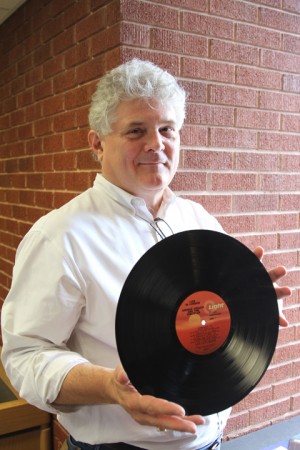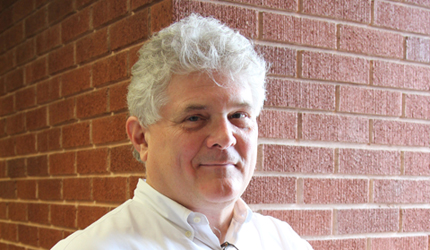
By Nick Dean
Editor in chief
The English have a word for Robert Darden’s feelings once he was notified he had won: Gobsmacked.
“Gosh, to be on that list. That is really how I felt,” Darden said.
Darden, associate professor of journalism and media arts, has been named this year’s Cornelia Marschall Smith Professor of the Year, a Baylor award that includes a $20,000 cash prize.
From intense researchers to the eloquent in-class lecturers, the recipients of the Professor of the Year award span a variety of departments and talents.
Darden — the first professor from the journalism and media arts department to win the award — is on a sabbatical that began this semester and ends in August.
“I was quite stunned. As I look over that list of previous winners, I see people who were both research-heavy and people who are great in-class lecturers. I was quite astounded,” Darden said. “It makes it even more special to me that the rest of the campus notices that over here in journalism and media arts we are doing some pretty good stuff. I think it is the best department on the campus.”
Dr. James Bennighof, vice provost for academic affairs, announced Darden’s award at the honors convocation Wednesday, pointing to his wealth of writing and research experience.
“In addition to having performed a great deal of service. …One of the most outstanding achievements has been closely connected to his research,” Benninghof said. “He has made it possible for Baylor to receive a grant that allows for the digital restoration of black gospel music. These materials will not slowly deteriorate to the point of being unusable, but rather will be made available to scholars around the world to access and study.”
Darden’s passion for oral history found in both the common man’s diary and the hardly-known musician’s lyrics has been the fuel for his most recent work in academia.
The Gospel Music Restoration Project is an initiative largely taken on by the Baylor Libraries and Darden to create a digital haven on Baylor’s campus for all gospel songs from the 1940s to the 1960s. The project — begun in 2005 — has secured the nation’s largest academic collection of gospel songs.
Darden said the help he has received from campus library staff has made the entire project possible.
“I could not do this without that help. Without them, I am just a guy who can’t work a cellphone,” Darden said.
Darden’s research, however, may have just begun because hidden among this collection is another trove of historical rarities.
On the B-sides of several gospel vinyl, Darden discovered nearly 50 songs with civil rights undertones toward the end of his Gospel Music Restoration Project work.
During his time away from the classroom, Darden’s focus has been writing a book discussing gospel songs with subversive lyrics supporting the causes of the civil rights movement.
Darden said this next book, with the current title “Nothing but Love in God’s Water: The Influence of Black Sacred Music on the Civil Rights Movement,” is the largest project he has tackled.
“It is kind of a continuation of the research in that the spirituals were coded messages and that the white overseers wouldn’t know about it,” Darden said. “Only people in the know knew they existed.”
At the start of these B-side discoveries, Darden found nearly 50 coded songs. He anticipates finding more in the campus gospel collection.
“The song title doesn’t always say it. Some are pretty obvious, like, ‘There’s No Segregation in Heaven.’ But others you just don’t know until you play them,” Darden said.
Darden has sought out several of the gospel artists and said some have affirmed their motives behind the lyrics.
Darden, a 1976 alumnus, began working at Baylor as an adjunct professor in 1988, teaching classes in the English and film and digital media departments. Ten years later he became an associate professor.
He said he tries to illustrate in his classes and his life the power of stories and experience.
“I think students and people in general are hardwired to learn by story more than just placing facts in front of them,” Darden said. “I have tried to find stories. In my research, I have tried to find the diaries and oral histories of the people that weren’t famous.”
And even in Darden garnering the Cornelia Marschall Smith award there’s a story: He has met the award’s namesake multiple times.
Darden had coffee with the legendary biology professor more than once. Smith passed down her knowledge of an often-overlooked aspect of the campus: its trees.
“One day she told me, ‘You know what? I want someone to know the story of all these trees on the campus when I am gone,’” Darden said.
“I asked her, ‘You mind if I am that person?’ and she told me, ‘Yes, I think that would be appropriate.’”
Darden followed her for several hours that day and through her stories — like one about how students knocked off Rufus Burleson’s hat by the tree in front of Old Main — learned more about the history of Baylor.
“What a marvelous inspiration — not just because of someone her age still teaching — but because she knew all of the trees and they mattered to her and she combined it with this great memory of Baylor — of old Baylor,” Darden said. “She combined practical and artistic and that is marvelous.”
That combination is something Darden strives for in his journalism and media arts classes, and he said good storytelling is at the heart of that department.
“I love the fact that virtually everyone in the journalism and media arts department has been a journalist. That when they are telling their students why they shouldn’t do something they can say, ‘I can tell you why not to do that and I have the scar to prove it,’” Darden said. “When journalism is at its best it is making sense out of chaos. And a journalist walks into an emergency or disaster situation and a good journalist can take thousands of stories from that one event and make a narrative out of it and help the people that are struggling understand what’s going on in that chaos.”
Dr. Clark Baker, chair of the journalism and media arts department and an associate professor, said Darden’s work and his talent more than qualifies him for this award.
“I certainly can’t think of a faculty member at this point in his career more deserving than Bob,” Baker said.
“He is a terrific colleague and he is doing some very meaningful research. His research is raising the visibility of Baylor and our department as well.”
Baker said the storytelling found in Darden’s classes is something his department strives to holistically incorporate.
“In our field in particular, it is very important for faculty to have been there and be able to speak from experience and be able to share what has worked and also what hasn’t — not only the success but where we have failed as well,” Baker said. “We pride ourselves in staying current and I think students benefit from that. We very much want to share what we know and what we have experienced.”
As this year’s recipient, Darden will give a lecture in the fall. He hopes to use the truth of storytelling he has learned from his time with Smith and as a journalism and media arts professor to convey the world’s need for good storytellers.
“[Smith] taught me and what some of my professors taught me at Baylor — and what I want to talk about in my speech in the fall — is that every one of my professors knew all of the facts in their discipline,” Darden said.
“But, more than that, they were masterful storytellers. I want and have been trying to make sure that all of my classes have that element of story in them.”
Darden is taking the chance to enhance students’ understanding of storytelling as a way to give back in the name of Smith.
“I know that there is nothing that would have pleased [Smith] more than to know an award was in her honor to acknowledge professors that are looking to do their best,” Darden said.
“I knew I was meeting someone special — but everything is better in hindsight and you wish you had spent twice as much time and gained twice as much knowledge.”






